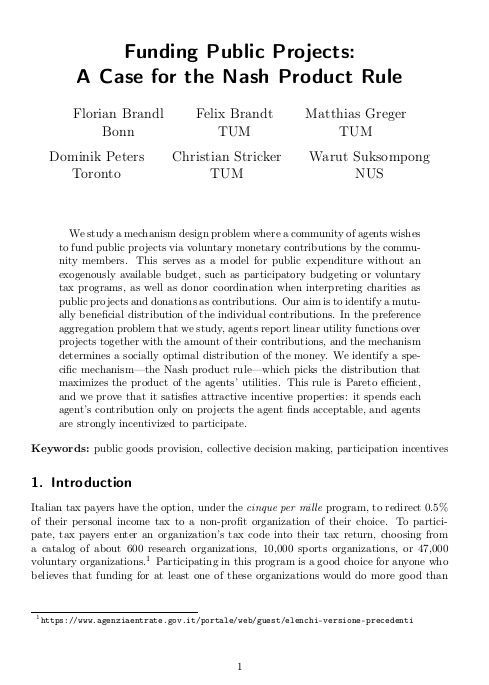Funding public projects: A Case for the Nash product rule
Florian Brandl (University of Bonn), Felix Brandt (Technische Universität München), Matthias Greger (Technische Universität München), Dominik Peters (University of Toronto), Christian Stricker (Technische Universität München) and Warut Suksompong (National University of Singapore)
GPI Working Paper No. 14-2021, published in Journal of Mathematical Economics
We study a mechanism design problem where a community of agents wishes to fund public projects via voluntary monetary contributions by the community members. This serves as a model for public expenditure without an exogenously available budget, such as participatory budgeting or voluntary tax programs, as well as donor coordination when interpreting charities as public projects and donations as contributions. Our aim is to identify a mutually beneficial distribution of the individual contributions. In the preference aggregation problem that we study, agents report linear utility functions over projects together with the amount of their contributions, and the mechanism determines a socially optimal distribution of the money. We identify a specific mechanism—the Nash product rule—which picks the distribution that maximizes the product of the agents’ utilities. This rule is Pareto efficient, and we prove that it satisfies attractive incentive properties: it spends each agent’s contribution only on projects the agent finds acceptable, and agents are strongly incentivized to participate.
Other working papers
Longtermism in an Infinite World – Christian J. Tarsney (Population Wellbeing Initiative, University of Texas at Austin) and Hayden Wilkinson (Global Priorities Institute, University of Oxford)
The case for longtermism depends on the vast potential scale of the future. But that same vastness also threatens to undermine the case for longtermism: If the future contains infinite value, then many theories of value that support longtermism (e.g., risk-neutral total utilitarianism) seem to imply that no available action is better than any other. And some strategies for avoiding this conclusion (e.g., exponential time discounting) yield views that…
Simulation expectation – Teruji Thomas (Global Priorities Institute, University of Oxford)
I present a new argument for the claim that I’m much more likely to be a person living in a computer simulation than a person living in the ground-level of reality. I consider whether this argument can be blocked by an externalist view of what my evidence supports, and I urge caution against the easy assumption that actually finding lots of simulations would increase the odds that I myself am in one.
On two arguments for Fanaticism – Jeffrey Sanford Russell (University of Southern California)
Should we make significant sacrifices to ever-so-slightly lower the chance of extremely bad outcomes, or to ever-so-slightly raise the chance of extremely good outcomes? Fanaticism says yes: for every bad outcome, there is a tiny chance of of extreme disaster that is even worse, and for every good outcome, there is a tiny chance of an enormous good that is even better.

